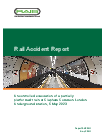Report 03/2024: Uncontrolled evacuation of a partially platformed train at Clapham Common London Underground station
RAIB has today released its report into an uncontrolled evacuation of a partially platformed train at Clapham Common London Underground station, 5 May 2023.

CCTV from Clapham Common station following passenger evacuation (courtesy of Transport for London).
Summary
At around 17:43 hrs on Friday 5 May 2023, a London Underground train departing from Clapham Common station was brought to a halt by a passenger emergency alarm activation after smoke and a smell of burning entered the train. The train came to a stand with two cars inside the tunnel and four cars adjacent to the platform. The train’s doors remained closed. Around 100 of the train’s (estimated) 500 passengers subsequently self-evacuated onto the platform through the interconnecting doors between the train’s cars and the train’s windows, some of which were broken by passengers either inside the train or on the station platform. Station staff began opening the train’s doors around four and a half minutes after the train came to a stand.
The incident resulted in minor injuries being reported by a few passengers. However, it had the potential to have more serious consequences, not least because Clapham Common station has a narrow island platform which increases the risk of passengers falling onto the track and potentially being exposed to conductor rails and trains approaching on the adjacent southbound line.
RAIB’s investigation found that passengers perceived a significant risk from fire, and that they became increasingly alarmed when the train’s doors remained closed and they did not receive suitable information or see any effective action from London Underground staff.
An underlying factor to the incident was that operational staff were not provided with the procedures or training needed to effectively identify and manage incidents where passenger behaviour can rapidly escalate. A possible underlying factor was that London Underground did not fully apply and retain learning from a previous similar incident at Holland Park station. Additionally, a further possible underlying factor was that London Underground had not identified the risk of passenger self-evacuation from partially platformed trains, including those taking place at narrow island platforms.
Recommendations
RAIB has made three recommendations, all addressed to London Underground. The first relates to procedures and training to ensure that staff have clear guidance on how to deal with out-of-course events. The second relates to learning from previous incidents not being lost and to recommendations being tracked through to implementation. The third recommendation is that London Underground review its risk assessment processes so that the risks associated with out-of-course events and at specific locations are effectively identified and assessed.
Andrew Hall, Chief Inspector of Rail Accidents said:
Out-of-course events can rapidly escalate into emergencies if not responded to promptly and effectively.
During this incident staff didn’t fully appreciate the emerging safety risk when passengers’ behaviour began to escalate as they became increasingly anxious. When passengers did not receive suitable information about the nature of the incident and the actions they should take, nor see action they would have expected to be taken, they turned to desperate measures to self-evacuate.
RAIB investigated a similar incident at Holland Park in 2013 and for a number of years that incident was used as an example to train staff about how to respond to such out-of-course events. However, it was subsequently removed from the training syllabus and since then knowledge of the lessons learnt may well have begun to fade. This incident again demonstrates that learning from past operational incidents needs to be retained by organisations.
Notes to editors
-
The sole purpose of RAIB investigations is to prevent future accidents and incidents and improve railway safety. RAIB does not establish blame, liability or carry out prosecutions.
-
RAIB operates, as far as possible, in an open and transparent manner. While our investigations are completely independent of the railway industry, we do maintain close liaison with railway companies and if we discover matters that may affect the safety of the railway, we make sure that information about them is circulated to the right people as soon as possible, and certainly long before publication of our final report.
-
For media enquiries, please call 01932 440015.
